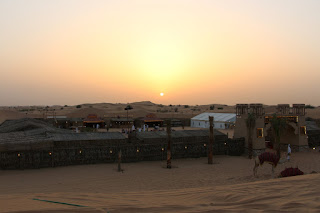It is impressive, though - the Dubaians anticipated an end to oil early and invested heavily into turning their emirate into a key business, transit, and tourist hub in the Middle East. Its central location makes it a natural global hub, being almost equidistant to the far reaches of the Earth (e.g. much easier to hold an emerging markets conference there than in Singapore where it takes 25+ hours to get to from Latin America).
Not having much time to explore surroundings, I did what most typical tourists do - eat lots of food, go up the Burj Khalifa, look at the various other architectural 'experiments', visit a few malls, and spend a day in the desert.
The added twist to this was having the opportunity to do this during the Holy Month of Ramadan, which did highlight that despite the modern veneer that Dubai presented the world, it was still a conservative country that respected its cultural roots. You do get fined for eating and drinking in public during daylight hours as it provides additional stress to those observing -- however, they also understood that not all can or want to observe the fast, and so special areas were curtained off from the public to allow those to eat and drink out of public view. An interesting fact is that most who observe the fast in the Middle East actually gain weight during Ramadan while that may sound counter-intuitive, all it takes is one iftar to understand why!
One thing I did see much of, however, were the native Dubaians themselves, who comprise only 15% of the population. Not once did I have the chance to interact with one during my time there (or at least to my knowledge) - perhaps next time.

















No comments:
Post a Comment